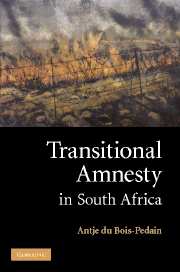Book contents
- Frontmatter
- Contents
- List of cited Amnesty Committee hearing transcripts
- Frequently cited Amnesty Committee decisions
- List of abbreviations
- List of abbreviated cases
- List of figures
- Preface
- Introduction
- 1 The TRC-based Amnesty Scheme: Background and Overview
- 2 The Practice of the Committee When Making Decisions
- 3 The Committee's Interpretation of the Political Offence Requirement
- 4 The Concept of Full Disclosure
- 5 Truth Recovery in the Amnesty Process
- 6 Victim Empowerment in the Amnesty Process
- 7 Perpetrator Accountability in the Amnesty Process
- 8 Conditional Amnesty and International Law
- 9 Conclusion
- Bibliography
- Index
6 - Victim Empowerment in the Amnesty Process
Published online by Cambridge University Press: 24 July 2009
- Frontmatter
- Contents
- List of cited Amnesty Committee hearing transcripts
- Frequently cited Amnesty Committee decisions
- List of abbreviations
- List of abbreviated cases
- List of figures
- Preface
- Introduction
- 1 The TRC-based Amnesty Scheme: Background and Overview
- 2 The Practice of the Committee When Making Decisions
- 3 The Committee's Interpretation of the Political Offence Requirement
- 4 The Concept of Full Disclosure
- 5 Truth Recovery in the Amnesty Process
- 6 Victim Empowerment in the Amnesty Process
- 7 Perpetrator Accountability in the Amnesty Process
- 8 Conditional Amnesty and International Law
- 9 Conclusion
- Bibliography
- Index
Summary
The alleged victim-centeredness of the truth and reconciliation process is the TRC's dominant justificatory theme. Archbishop Desmond Tutu in his foreword to the TRC Report presents the Commission as committed to ‘another kind of justice … which is concerned … with correcting imbalances [and] … focuses on the experience of victims’. Likewise, the Commission describes its search for truth as directed towards ‘helping victims to become more visible and more valuable citizens through the public recognition and official acknowledgement of their experiences’. The TRC's supporting discourse thus, as Stéphane Leman-Langlois observes, ‘gives victims the centre stage usually reserved for wrongdoers in conventional justice processes’ and in doing so, ‘displace[s] … the measure of the project's success away from retribution and towards the victims’ participation and expected benefits'.
The amnesty scheme is often presented as an integral part of this re-orientation. Conditional amnesty is held out as something that can provide tangible advantages and benefits to victims, though of a different sort from those that arise from the activities of the other two committees of the TRC. However, the extent to which the amnesty process can claim to respond to victims' needs is questionable. After all, amnesty deprives the victims of politically motivated crimes of their right to see justice done according to law, as well as of their claims to compensation against the perpetrators and any organisation behind them, including the state.
- Type
- Chapter
- Information
- Transitional Amnesty in South Africa , pp. 217 - 256Publisher: Cambridge University PressPrint publication year: 2007



